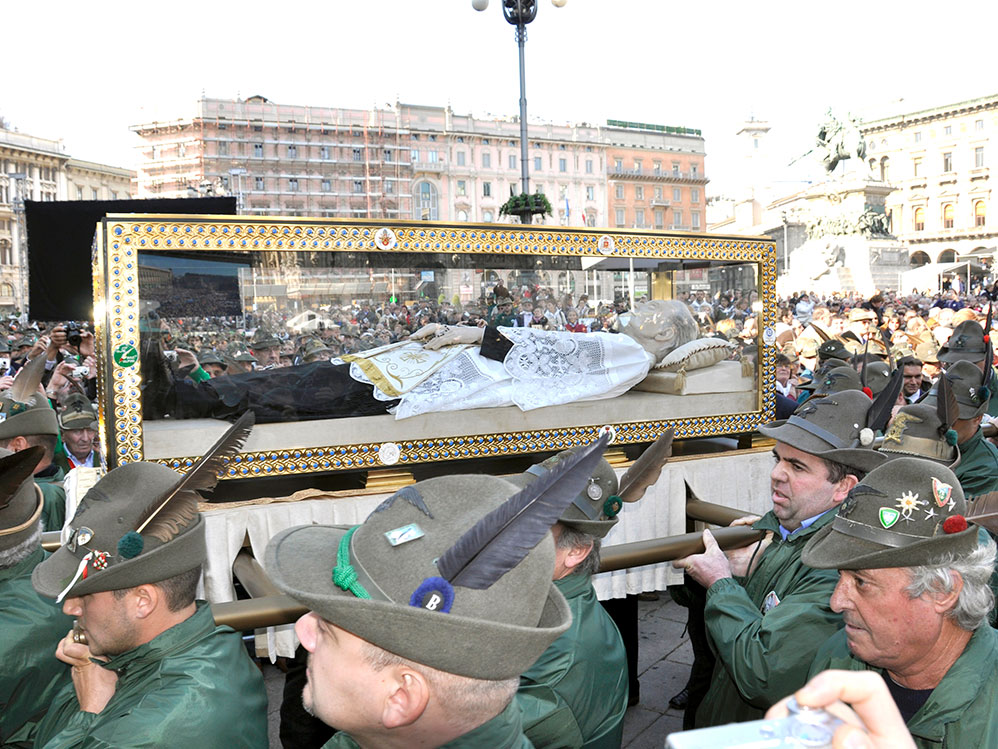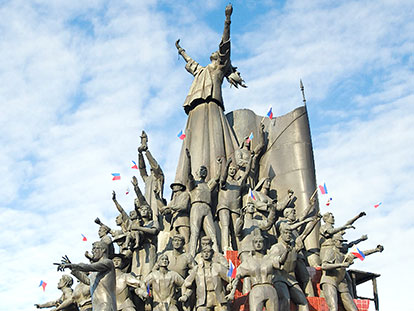On a Saturday, sometime in June 1997, I was driving from London to Liverpool for a mission appeal. After four hours of peaceful progress through the English countryside, I was getting to the street where the parish was supposed to be, in the outskirts of the city. The time of the anticipated Mass was approaching. Driving the whole length of the street, I realized that there was no church in sight. I was puzzled, then I understood that there must be another street of the same name in the inner city. I, therefore, took the thoroughfare to the center of Liverpool. It was less than half an hour to the Mass and I started to panic. “Please, Saint Joseph” I prayed, “Help me to arrive on time!” As I was driving, I saw a sign with a word I seemed to recognize, I branched to the right, I stopped to question a pedestrian, I was in the right direction… Eventually, I entered the church with five minutes to spare. “Dear father,” the parish priest said rather resentfully, “You do cut it thin, don’t you?” Of course, he didn’t know that I was there only due to a special grace from Saint Joseph!
On the following month, July 20 1997, coming back from a priestly ordination in Spain, I was flying from Valencia to Barcelona, where I had my connecting flight to Venice. The plane was late. We had not landed yet and it was already time for the Venice plane to take off. I was already imagining missing that plane with all the inconvenience that goes with it. “Dear Saint Joseph” I cried, “Don’t let me miss the plane!” As God wanted, we landed, I ran to the departure gate of my flight (It was deserted!) only to be addressed by the hostess at the counter: “Are you Mr. Carraro?” “Yes?” “Please get in quickly. We are taking off.” Even that time, thanks to Saint Joseph, I made it! These are only two examples of numberless others…
Behaving thus, I was only continuing the tradition of devotion to Saint Joseph that was proper of Saint Daniel Comboni. It is a spontaneous, affectionate link with this saint whom we perceive to be so helpful in the practical, day-to-day facts of life. Daniel Comboni considered Saint Joseph an asset for his mission, especially in financial matters. He mentions him not less than 150 times in his writings and likes to address him with the affectionate name of Beppo (vernacular form for Joseph). He wrote: “Saint Joseph is one of the most precious treasures of the Church and of Africa and he is my real administrator and bursar. In dealing with Saint Joseph, one is dealing with a gentleman; and Beppo is such a gentleman that he first thinks of the spirit and our souls, and then of the money… So, courage. No obstacle frightens us. Many great napoleons and pounds sterling are hidden in Saint Joseph’s beard; he will give them to us when we need them.” Somehow, Daniel Comboni’s devotion to Saint Joseph is the expression in history of the place that this saint has gained in the heart of the Christian people.
A rich, eventful life
From the outline provided by the Gospel infancy narratives, however scanty, Saint Joseph’s life appears rich and eventful. After an initial moment of stunned disbelief at Mary’s condition, he receives his own Annunciation in a dream; he marries her and gets her to Bethlehem; takes mother and child off to Egypt when they are threatened by the murderous King Herod; then settles them in Nazareth. Yet, there are important omissions. Joseph is not explicitly described as present at Jesus’ birth or at the reception of the shepherds. The trip to Egypt is not actually recounted. The last reference to Joseph as a living person – a single sentence – occurs when Jesus is twelve, shortly after Christ had made a rather cutting distinction between His parents on earth and His “real“ Father. Joseph’s death goes unrecorded.
Very soon, the gaps of the Gospel were filled by the imagination of the Apocrypha, those books, contemporary to the canonical ones of the New Testament that were excluded from the official list because of their historical unreliability and spiritual errors. The most influential one elaborating Joseph’s story was the 2nd century text called The Protevangelium of James. They are the ones that made Saint Joseph a ninety-year-old man, with other children from a previous marriage… On the whole, the Apocrypha were a dead end. Their creativity was a liability. The 4th century Church father, Saint Jerome, called them deliria (hallucinations).
A protector and nurturer
In the first millennium of Christianity, Joseph was not a popular saint. His name doesn’t appear in any list of saints before the year 1000. Beginning in the late 1300s, Joseph enjoyed one of the greatest religious rehabilitations in the history of Christian spirituality. Two dynamic clerics thought it sound enough to propose Joseph the Carpenter as the paternal model of the Christian family. The first is Jean Gerson, the chancellor of the University of Paris, who suggested that the age of Joseph at the time of his marriage was 36 because that is the age in which a person reaches the “prime of life,” according to the philosopher Aristotle. That is the age of the great poet Dante Alighieri when, as he wrote in the Divine Comedy, he started his fantastic journey to the otherworld.
Saint Bernardino of Siena, a powerhouse preacher like a Billy Graham of his time, was the second champion of the devotion to Saint Joseph and he highlighted the saint’s qualities as an administrator and craftsman. They were proposing Joseph as a figure who would help to navigate the crisis of the family and the Church: as a protector and a nurturer. “Why not pray to Saint Joseph, Bernardino asked, since Christ does not now deny to Joseph that intimacy, reverence and very high honor which He gave him on earth, as a son of his father.”
A great champion of the devotion to Saint Joseph is Teresa of Avila. Born in 1515, she was one of the Catholic Church’s greatest mystics and, through tireless work of founding and defending a new model for convents and monasteries, a heroine of the Counter-Reformation, Catholicism’s vigorous response to the challenge of Protestantism. After praying to Joseph, she was cured of her early case of paralysis and she adopted him as her “true father,” stating that “in heaven God does whatever he commands.” Teresa took the Nazareth household as the model of her order and named 12 out of 17 monasteries after Joseph.
The devotion snowballed and the earthly trinity of Jesus, Mary and Joseph took Catholic Europe by storm. It also leaped to the New World, where Joseph became the patron saint of both “New Spain” and “New France.” To this day, he remains the official saint of Catholics in Mexico and Canada. At last, his looks changed: the deviant influence of the Apocrypha was overcome. Artists like Murillo started giving him the vigorous features of a young man. The Gospels’ accounts, taken at their face value, yielded the aspect of Joseph as patron of virgins and of families, and the silence about his death was filled by the obvious devotion of thinking that his life ended with Mary and Jesus at his side and, therefore, he became the natural protector and patron of the dying.
Eventually, he was assumed to protect, from heaven, the Universal Church as he had the Holy Family on earth. In 1955, Pope Pius XII put in evidence Saint Joseph as a working man, decreeing a second feast day for him on May 1 to compete with communist May Day. In 1962, Pope John XXIII inserted Joseph’s name in the Canon of the Mass, reportedly the first such addition in over 1300 years.
Guardian of God’s mystery of love
In 1989, Pope John Paul II wrote an encyclical letter by the title Redemptoris Custos (The Guardian of the Redeemer): “On the person and mission of Saint Joseph in the life of Christ and of the Church.” We can consider it the point of arrival of the theological reflection and devotional love of the Christian community for Saint Joseph. The Pope stated his desire to “offer some reflections concerning him to whose custody God entrusted His most precious treasures. In this way, the whole Christian people not only will turn to Saint Joseph with greater fervor and invoke his patronage with trust, but will always keep, before their eyes, his humble, mature way of serving and taking part in the plan of salvation.”
The Pope continued: “I am convinced that, by reflecting upon the way that Mary’s spouse shared in the divine mystery, the Church – on the road towards the future with the whole of humanity – will be enabled to discover ever anew her own identity within this redemptive plan, which is founded on the mystery of the Incarnation. This is precisely the mystery in which Joseph of Nazareth shared like no other human being except Mary, the Mother of the Incarnate Word. He shared in it with her; he was involved in the same salvific event; he was the guardian of the same love, through the power of which the Eternal Father destined us to be His children through Jesus Christ.”
The figure of Saint Joseph has interested lately even some worldly and Protestant authors, like Howard Edington who, in the book The Forgotten Man of Christmas, writes: “Joseph took God’s Son into his home in Nazareth, thus providing Jesus with a normal, loving family environment in which to grow. And again Joseph took God’s Son into his heart, thus discovering a purpose for his own life within the greater purposes of God.” And Anne Rice, in her book on the infancy of Jesus, Christ the Lord Out of Egypt, writes: “I think Joseph was a resolute man, an unshakable man, but he had no need to make a lot of noise about it. He takes over and does what has to be done.”
To Saint Joseph, we can fittingly apply the following passage about silence by an unknown author: “Silence is meekness. When you do not answer those who offend you; when you don’t claim your rights, when you leave to God to defend your honor, silence is meekness. When you don’t reveal your brethren’s faults, when you forgive without inquiring the past, when you do not condemn but intercede within yourself, silence is mercy. When you suffer without complaining, when you do not look for consolation among human beings, when you do not intervene, but wait for the seed to grow slowly, silence is patience. When you keep silent so that your brothers may emerge, when you hide in your discretion God’s gifts, when you allow your doings to be misinterpreted, when you leave to others the glory of the enterprise, silence is humility. When you keep silent because it is God who acts, when you renounce the sounds, the voices of the world in order to stay in His presence, when you do nor search for understanding because it is enough for you to be known by Him, silence is faith. When you embrace the cross without asking why, silence is adoration.” In Saint Joseph’s life, silence is meekness, patience, humility, and especially faith and adoration.








